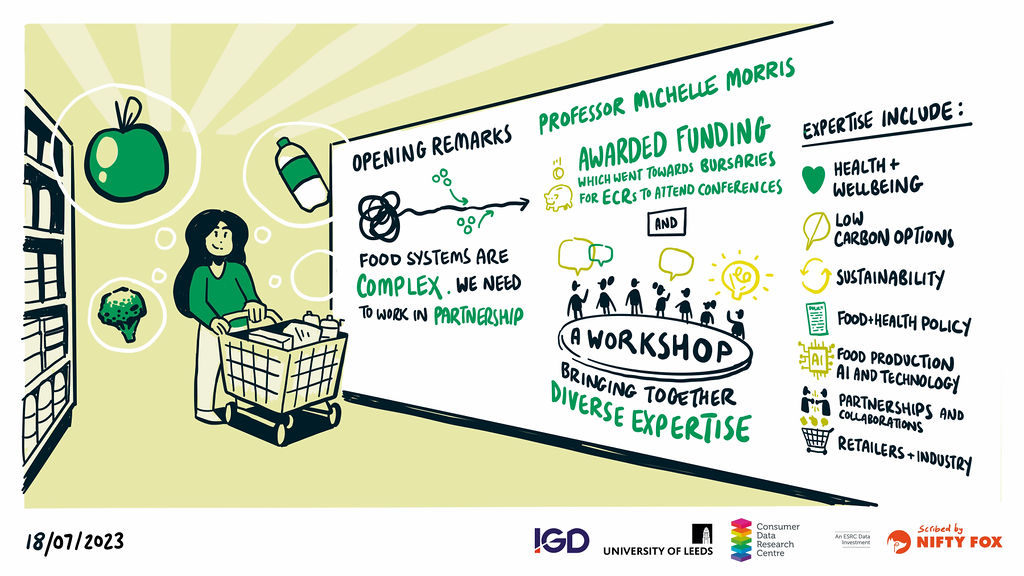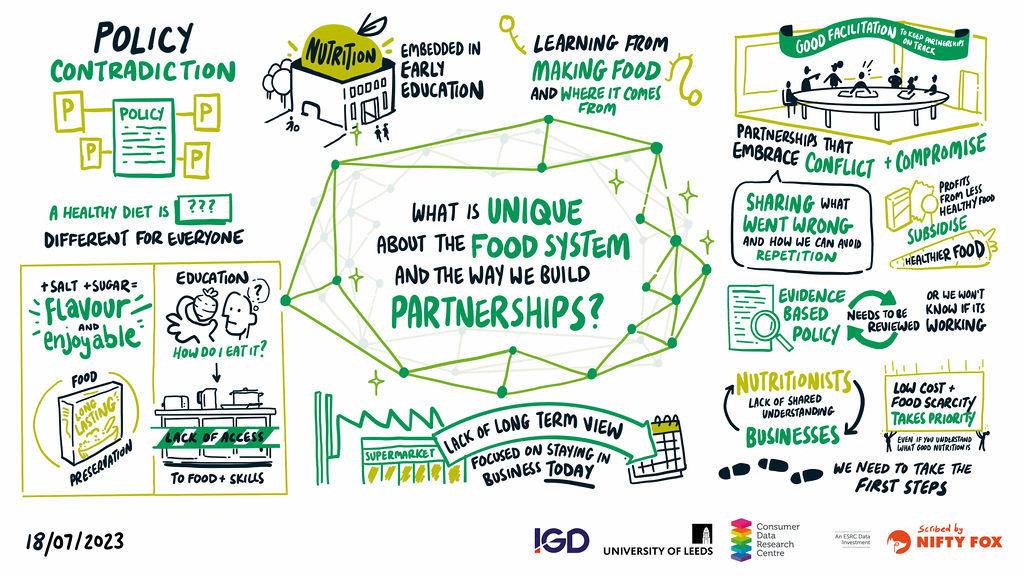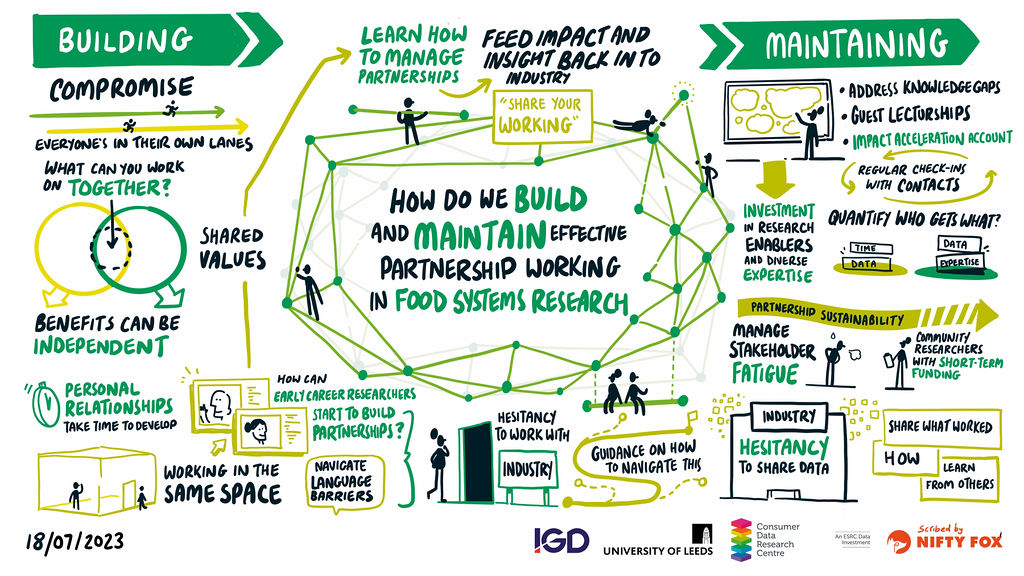We were delighted to host colleagues from a variety of disciplines and functions at the University of Leeds, the charity sector, industry representatives and local government at the Leeds Institute for Data Analytics on the 18th July 2023.
We came together for a workshop to discuss “Encouraging Healthy and Sustainable Diets through Cross-Sectoral Partnerships”.
The aim of the workshop was to better understand what makes a good partnership for research across the food system with a key objective to create a shared resource to promote and share lessons on partnership working.
Specifically, we discussed two main questions:
1 – What is unique about the food system and the way we build partnerships?
2 – How do we build and maintain effective partnership working in food systems research?
The complexity, breadth and depth of food system research mean that cross sectoral partnerships are even more essential to facilitate research that can drive change, however it also means that focused discussions are challenging too. With that in mind, we put some guide rails around the discussion, which were to focus on the consumer facing part of the food system. After all, we are the Consumer Data Research Centre!
We are grateful to the University of Leeds Engaged for Impact awards who celebrated our work building networks with supermarkets to assess healthy and sustainable consumer diets, in collaboration with the IGD (Institute of Grocery Distribution). The prize money facilitated the running of this workshop, and has additionally provided important bursaries for early career colleagues to attend conferences to build their own networks and partnerships. We were awarded this prize for our work in the area of building Partnerships and Networks and wanted to make sure that we were able to develop our own ways of working by learning from others, but also capture and share learnings in an accessible way to a wider audience.
The workshop was convened by Prof. Michelle Morris, Professor Data Science for Food and CDRC Co-I and Dr Emily Ennis, CDRC Research and Impact Manager. The delegate expertise spanned health and wellbeing, sustainability and low carbon, food and health policy, food production, AI and technology, partnerships and collaboration, retailers and industry and more.
It was our pleasure to welcome Chris Redford from NiftyFox to the workshop who skilfully captured our discussions so well through live scribing.

What is unique about the food system and the way we build partnerships?
We reflected on the complexity of the food system which is highlighted by the large number of government departments with responsibility for food, including, but by not limited to: the Food Standards Agency; Department for Environment, Food and Rural Affairs; Department for Health and Social Care; Office for Health Improvement and Disparities; Department for Business and Trade.
Given the breadth of the food system we often lack a shared language and even shared definitions of concepts like ‘a healthy and sustainable diet’. We encounter challenges from the commercial nature of much of the food system and the need for a pre-competitive space to share learnings. The food sector is turbulent which often means that there is a culture of firefighting, rather than long term planning. This is contrary to local (and national) government which have long horizons. This can result in a disconnect within the food system. The sector needs to respond rapidly to system shocks like Brexit, the covid-19 pandemic, war in the Ukraine and the cost-of-living crisis. In light of all of this collaborations should expect to need to overcome conflict which likely leads to inevitable compromise if we are to move forwards.
We discussed the tricky matter that nutrition is not always respected as a science. Many celebrities masquarade as nutrition experts, without the appropriate qualifications. This makes it harder for qualified and registered nutritionists to be heard and make an impact. Currently there is a voluntary register for Nutritionists managed by the Association for Nutrition, with the vision to achieve chartered status for the profession.
Food is something required by everyone. It is more than a fuel to stay healthy, it is indicative of different cultures, it is a pleasure, it is a career, it needs to be safe which requires understanding and education. It also costs money, and this means that it is a focal point of our current cost of living crisis and will be at the heart of inequalities for years to come if unchecked.
It is a combination of all of this that makes the food system different to other areas and industries and impacts upon how we collaborate.

How do we build and maintain effective partnership working in food systems research?
The essence of this discussion was about finding the shared value from the collaboration, where all parties benefit. This requires listening, sometimes compromising and investing time in building a trusted partnership and then dedicating time to maintaining the partnership.
At times we just need to jump in with both feet and start a collaborative project. We may need to start small, but the process of working together to a shared goal will allow the partnership to grow and generate evidence which will demonstrate the need for further investment.
Often collaborations come down to the people involved, and it is important to share the learnings from personal experience and relationships with early career colleagues. We need to ensure that we teach and share the ways of working, going beyond the technical skill development, but including the alpha skills that will stand them apart in the future. These colleagues are the key to maintaining relationships longer term. The development of the next generation needs to happen across all the organisations involved in the partnership working. We discussed many ways in which this could happen, including shared spaces for working, secondments and specific investment in capacity building.
Caution is needed with regards to stakeholder fatigue, for research partners, be-it industry, policy makers or the third sector, collaborating with academics is unlikely in their job description, they go over and above for things they are passionate about. We also need to be mindful of reputation, not all academic disciplines aligned to the food systems are accepting of collaboration with industry. We need to support colleagues to manage ways of working that do not compromise academic integrity.
Timelines are important and these vary depending upon the partner, these should be discussed up front and expectations managed and ways of working adapted accordingly.

This workshop has created shared learnings generated from all twenty delegates. It has additionally extended the delegates’ networks, many of whom met for the first time at this workshop. We plan to share the images from this blog widely to support future food system collaboration and partnerships to encourage healthier and more sustainable diets, please help us with that.
You are welcome to re-use these images, but please include the following acknowledgement:
“Thanks to all participants at the Healthy and Sustainable Diets Partnership Workshop at the University of Leeds on Tuesday 18th July 2023, whose contributions are represented in these images. The workshop was funded by a University of Leeds Engaged for Impact Prize and convened in collaboration with the Consumer Data Research Centre (Leeds). Artwork Scribed by NiftyFox https://www.niftyfoxcreative.com/”

